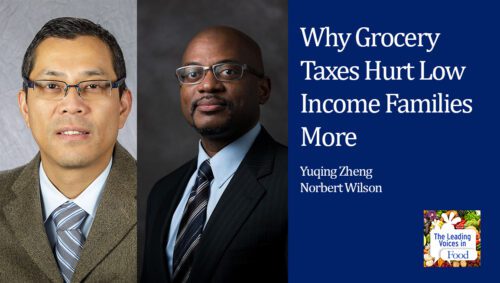This project focuses on the link between food insecurity and grocery taxes, which include sales taxes on food at retail outlets such as grocery stores, convenience stores, among others, but not on restaurants. Our contributions are three-fold: first, we provide the first comprehensive documentation of state- and county-level grocery taxes and present a descriptive analysis of states and counties that impose grocery taxes. Second, we estimate the effect of grocery taxes on the probability of food insecurity in the United States using data from 2006 through 2017. A primary empirical challenge of such a task is the spatial endogeneity of grocery taxes. States with grocery taxes are concentrated in the South and Southeast United States so that taxes are likely correlated with several other spatially related characteristics. We address this source of endogeneity by controlling for state- or county-level dummy variables. Assuming the onset and withdrawal of grocery taxes in a county over time is exogenous to other time-varying factors, we are able to identify the effect of grocery taxes on food insecurity conditional on our spatial controls and dummy variables. As discussed later in the model section, a second challenge of identification—one common to all observational studies with non-randomized treatment variables—is that grocery taxes are not randomly assigned within a county over time and so are potentially endogenous. For example, if the adoption of increased grocery taxes reflects a decreasing policy priority of food security relative to other policies within a county over time, our estimates likely provide an upper bound of the tax impacts. Similarly, if the adoption of increased grocery taxes reflects an increasing policy priority of food security relative to other policies within a county over time, our estimates likely provide a lower bound of the tax impacts. Nonetheless, the empirical analysis in this study provides the first assessment of the potential effects of grocery taxes on food insecurity. As a third contribution, we provide policymakers, who currently lack any estimates of the impacts of proposed or possible changes in grocery taxes on food insecurity, an assessment of these potential impacts for specific states.
Related Podcasts
PROJECT DETAILS
October 1, 2019 - April 1, 2022PROJECT TEAM
- Norbert Wilson, Duke World Food Policy Center
- Yuqing Zheng, University of Kentucky
- Jianqiang (Jason) Zhao, Cornell
- Steven Buck, University of Kentucky
- Shaheer Burney, University of Wisconsin
- Harry M. Kaiser, Cornell

